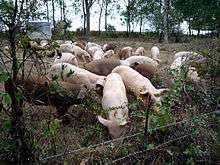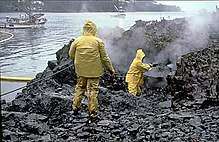Ethical eating
Ethical eating or food ethics refers to the moral consequences[1][2] of food choices, both those made by humans for themselves and those made for food animals. Common concerns are damage to the environment,[3] exploitive labor practices, food shortages for others, inhumane treatment of food animals, and the unintended effects of food policy.[4] Ethical eating is a type of ethical consumerism.
Concerns
Environmental
Certain methods of food production and certain types of foods have greater environmental impacts than others. The Union of Concerned Scientists advises that avoiding eating beef is one of the two most important actions most people can take to help the environment[5] because of the large amounts of water needed to produce beef, the pollution from fecal, ammonia, carbon dioxide and methane waste associated with raising cows, the physical damage from grazing, and the destruction of wildlife habitat and rainforests to produce land for grazing.[5] Industrially produced meat, such as that from animals raised in Confined Animal Feeding Operations or CAFOs, has "the greatest impact of any food product on the environment".[3]
Packaging of commercially produced foods is also an area of concern,[3] because of the environmental impact of both the production of the packaging and the disposal of the packaging.
Transportation of commercially produced foods can increase that food's impact on the environment.[3]
Labor practices
Within the food system there are many low-paid occupations. Many farm workers are paid below-minimum wages[6] or work in substandard conditions, especially farm workers in developing countries and migrant workers in industrialized nations. Jobs within food processing [7] catering[8] and food retailing[9] are also often poorly paid and sometimes hazardous.
Distribution of wealth
Since the 1980s, policies promoting global free trade have increased the amount of food exported from poorer countries, which may adversely affect the food available for their own populations.[10] Campaign to reduce levels of food imports, however, may reduce the incomes of farmers in poorer countries, who rely on export sales.[11]
Food availability
Since the 1950s, the food system has become increasingly global and a small number of multi-national corporations now dominate trade in many foodstuffs.[12] One result is that the proportion of industrially processed foods in diets is increasing globally.[13] Public health researchers label these changes the nutrition transition, arguing that, in poorer countries, they are causing increasing rates of non-communicable diseases, such as diabetes.[14]
Food animal treatment
Many food animals are raised inhumanely.
Policy
Many governmental food policies have unintended consequences.
Specific food choices
Meat

Some ethicists argue that the keeping and killing of animals for human consumption is in itself unethical.[15] Others point out that animal husbandry is "essential to sustainable farms, which don't rely on fossil fuels and chemicals," rather using animal waste as fertilizer and animal activity as weed and pest control and using animals to "convert vegetation that's inedible to humans, and growing on marginal, uncultivated land, into food."[1][16]
The method in which food animals are raised and the type of food animal affect the ethics of eating that animal. Farm-raised oysters cause minimal environmental damage and are raised humanely.[17]
Dairy and eggs
Dairy and egg production have ethical consequences, in particular in large-scale industrialized production. Chickens and milk-animals raised in industrial operations are often treated inhumanely.
Small-scale production of eggs, such as by backyard chicken raisers and small diversified farms raising pastured birds or milk-animals, are less ethically fraught but still create some issues for ethicists.
Seafood
Industrial fishing has broad effects with ethical consequences.
Crops
Some foods produced in developing countries are exported in quantities that threaten the ability of local residents to affordably obtain their traditional foods. Western demand for quinoa, a traditional food in Bolivia Peru and Ecuador, has become so high that producers are eating significantly less of the grain, preferring to sell it for import instead and sparking concerns about malnutrition.[18]
Criticisms
Some critics of the food ethics movement argue that parsing the various concerns is futile.[1]
Fairtrade International, the certifying body for Fair Trade products, has been accused of "misleading consumers about its ability to monitor production practices"[6] and giving Fairtrade certification to at least one coffee association despite the fact they were "illegally growing some 20 per cent of its coffee in protected national forest land."[6]
Areas of agreement
Most food ethicists agree that some food choices are more ethical than others.
References
- 1 2 3 "Put Your Ethics Where Your Mouth Is". New York Times. Retrieved August 13, 2015.
- ↑ "ETHICAL EATING: FOOD AND ENVIRONMENTAL JUSTICE". Unitarian Universalist Association. Retrieved August 13, 2015.
- 1 2 3 4 Newcomer, Laura (August 24, 2012). "33 Ways to Eat Environmentally Friendly". Time. Retrieved August 15, 2015.
- ↑ "2011 Statement of Conscience". Unitarian Universalist Association. Retrieved August 13, 2015.
- 1 2 ,Boyan, Steve. "How Our Food Choices can Help Save the Environment". EarthSave. Retrieved August 15, 2015.
- 1 2 3 Weitzman, Hal. "The bitter cost of 'fair trade' coffee". Financial Times. Retrieved August 15, 2015.
- ↑ Broadway, Michael J.; Stull, Donald D. (2010-04-26). "The Wages of Food Factories". Food and Foodways. 18 (1–2): 43–65. doi:10.1080/07409711003708413. ISSN 0740-9710.
- ↑ Woolever, Laurie (2012-03-22). "High-End Food, Low-Wage Labor". Dissent. 59 (2): 26–32. doi:10.1353/dss.2012.0036. ISSN 1946-0910.
- ↑ Lichtenstein, Nelson (2005-01-01). "Wal-Mart and the New World Order: A Template for Twenty-First Century Capitalism?". New Labor Forum. 14 (1): 20–30. JSTOR 40342518.
- ↑ Brigham, Anne Margrethe (2011-11-01). "Agricultural Exports and Food Insecurity in Sub-Saharan Africa: A Qualititative Configurational Analysis". Development Policy Review. 29 (6): 729–748. doi:10.1111/j.1467-7679.2011.00554.x. ISSN 1467-7679.
- ↑ Vidal, John; editor, environment (2007-10-25). "Air-freight food must pass fair trade test to retain organic label in future". The Guardian. ISSN 0261-3077. Retrieved 2017-02-21.
- ↑ Lang, Tim (2003-09-01). "Food Industrialisation and Food Power: Implications for Food Governance". Development Policy Review. 21 (5–6): 555–568. doi:10.1111/j.1467-8659.2003.00223.x. ISSN 1467-7679.
- ↑ Kearney, John (2010-09-27). "Food consumption trends and drivers". Philosophical Transactions of the Royal Society B: Biological Sciences. 365 (1554): 2793–2807. doi:10.1098/rstb.2010.0149. ISSN 0962-8436. PMC 2935122. PMID 20713385.
- ↑ Popkin, Barry M; Adair, Linda S; Ng, Shu Wen (2012-01-01). "Global nutrition transition and the pandemic of obesity in developing countries". Nutrition Reviews. 70 (1): 3–21. doi:10.1111/j.1753-4887.2011.00456.x. ISSN 0029-6643. PMC 3257829. PMID 22221213.
- ↑ Zevnik, Neil (January 26, 2015). "The Humane Omnivore: An Oxymoron?". The Huffington Post. Retrieved August 13, 2015.
- ↑ Niman, Nicolette Hahn (December 20, 2011). "Eating Animals". The Atlantic. Retrieved August 13, 2015.
- ↑ Cox, Christopher (April 7, 2010). "It's Okay for Vegans to Eat Oysters". Slate. Retrieved August 13, 2015.
- ↑ Collyns, Dan (January 14, 2013). "Quinoa brings riches to the Andes". The Guardian. Retrieved August 13, 2015.
Further reading
- Kaplan, David M. (ed.). The Philosophy of Food, University of California Press, 2012.
- Hardy, Anne, (2016). 'Food Poisoning: An On-going Saga'. History & Policy. http://www.historyandpolicy.org/policy-papers/papers/food-poisoning-an-on-going-saga.
